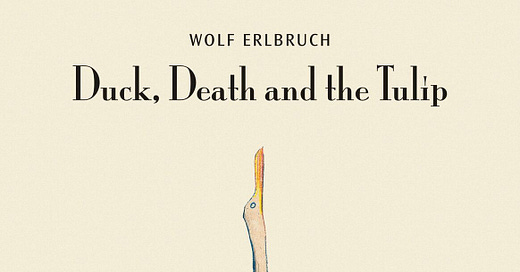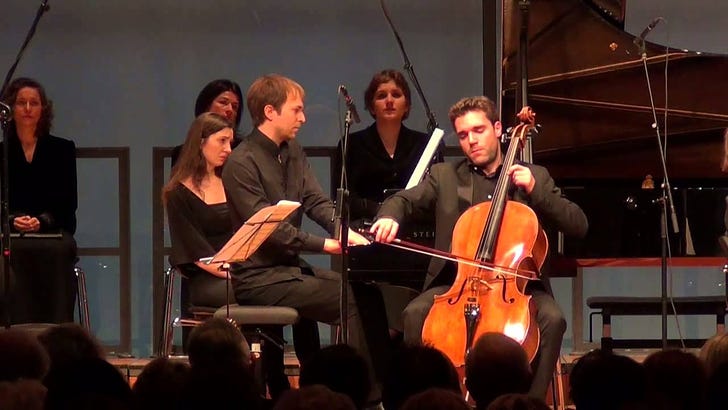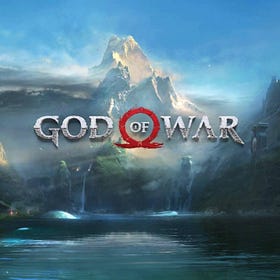On Monday, we launched a new podcast where we tackle epic fantasy series. We’re starting with Joe Abercrombie’s First Law! So hop along and join us as we discuss a series that really opened the floodgates to the grimdark genre.
This isn’t something I wanted to write this week or even something I planned on writing. Instead, I was going to write about a genre that I’m currently just calling Masculine Fiction, but my dad keeps on dying, keeps on trying to not live, so here I am writing once more about my father’s long decline.
Duck, Death and the Tulip by Wolf Erlbruch is a beautiful children’s book about dying and death and acceptance. I bought it a few years ago when my nephew’s grandfather seemed to be dying. It was going to be a gift for him. But his grandfather survived. I brought it back out in 2022 when my father had a series of strokes and seemed determined to do everything possible to die.
I wrote a eulogy of sorts for him here:
House of the Dragon: Episode Eight
Welcome new readers! I hope you’re not expecting more small press drama.
Why I put it inside a review of an episode of a TV show is maybe something a bit unforgivable, but I do think it’s some of the best writing I’ve done on here. So even if you’ve never watched House of the Dragon, I’d recommend it.
I wrote about my father here too, using his own words for the title.
I have long been obsessed with death. Mostly my own. I seem to always be writing about it1, one way or another.
I meant to write about death, only life came breaking in as usual.
—Virginia Woolf
I feel that in my bones, except in reverse. I often try to write about life but death comes pouring out instead.
I have longed for death often and so I do not blame my father for wanting to die.
His pain has become too much. Nearly unbearable at times. His body grown to a cage, trapping him in his life, in his misery. And so I would let him die if I could.
He will not kill himself. Religion will not allow such actions and so he makes choices that hasten his death. Yet still he lives, tottering on as the days and weeks and years go by. He fears leaving the house. Fears having an epileptic seizure out in the world, in the wilds, on the streets of Saint Paul where he will then lie gasping for breath, begging for death.
He drinks too much.
Considering his medical conditions, he should not drink at all. Instead, he drinks a great deal. This gives him gout which gives him pain. This makes the epileptic seizures more likely, the strokes almost a certainty. His whole world has shrunk to the size of his house. And so he wanders his tomb on unsteady steps, refusing medical help, refusing to take advice.
He is a man waiting to die.
And there is something so mundane and banal about this.
We all must die.
We all will die.
But first we live.
And our lives, for all our hopes and plans, are full of the mundane and the banal. Daily, we rise and brush our teeth and eat our little meals and count calories and agonize about how many steps we took each day, how little exercise we get, how our hair is falling our or greying or both.
Life is the mundane, the unremarkable. There’s great beauty in this, if you have the eyes to see, the ears to hear, the heart to feel.
But death is just another part of life, so why shouldn’t it be just as mundane and unremarkable?
And I think this is what Duck, Death and the Tulip captures so well. The Duck feels a bit of a shadow on his life. He meets Death and assumes the worst. But Death is more of an observer, and then simply a companion, of sorts. They spend time together, the way friends might. They talk and share space and time.
One morning, Duck dies and Death carries him to the River where he sets his body floating on. From there, Death walks on, carrying on with the rest of his life, such as it is, if you can call it life, given who Death is.
And I feel this acutely.
Life begins and it goes on and then one day it’s over and we fade into nothingness.
This is a comfort to me.
To be nothing.
To exist no more.
To know that life goes on without me.
I was here and then I wasn’t.
A flashing moment of me.
My father is dying, but first he lived. He lived through his father’s death when he was eight and he lived through the deaths of surrogate fathers. My father is a man who once smiled easy, who laughed often, who found great joy in life.
He was never one who longed for death. He lived fully, loudly, vibrantly.
And so his long, slow death is crushing him.
It’s hard to see.
And to witness how he makes choice after choice that makes his life actively worse is not only difficult but also incredibly annoying.
He aggravates me, though that’s not a kind thing to say about a man dying. But I’m also my mother’s son and I see how hard this is for her. To witness how she tries not to take it personally, this death drive, this hunger for the end.
a mother's son
I’m supposed to be doing several things today, including promoting my new book, Gnashing Teeth, the next book in our Star Trek meets Firefly series of space operas. I would greatly appreciate it if you checked it out.
I have never been the son my father needed or even wanted yet I am the one holding him up in various ways. It’s not something either of us planned. Not something anyone planned. But necessity locked us together and responsibility shackled me yet further. Not only responsibility to him but also to my mother.
And I’m reminded how the first thing I wrote at this newsletter was, in part, about him and his dying.
God of War: God of Games
I never played the many previous God of War games. I’ve heard they’re fun and exciting and brutal fighting games — and I love fighting games — about the Greek pantheon — and I love dead gods — so I knew they were likely the kind of game I’d love to love to talk about because I’m the kind of insufferable fool who will tell you about how Orpheus birthed S…
When someone is dying for years, there are long stretches of time where you almost forget. Where this decrepit version of who he’s become feels like the one he has always been. This husk of a man, dying, falling apart, refusing help, refusing to be better, to get better, making every possible choice to hasten the ending yet it remains still out of reach.
But perhaps not for long.
He has an infection that is quite treatable. He doesn’t believe the doctor and so this infection, left untreated, will likely kill him.
But first he will suffer unbearable pain while he refuses these little pills that would at least wash the infection away.
And perhaps that’s why he doesn’t. When the infection’s gone, he’ll still be himself.
He’ll still be trapped in a body of pain, in his cage of a body, in his tomb of a home.
I wish I could give you some great insight, tell you something true about death and dying, about life and how it goes on, carries on, whether we like it or not. But I have so little to say, finally, about something I’ve spent my whole life thinking about.
I have almost died too many times and it never changed me. It never made me new. Each time became another unremarkable flare of light in my life.
I remember looking up at the cliff I fell from, hearing my friends call out to me, eddy, are you dead, and I remember the waves I nearly drowned on off the cost of California, those waves that held me under and the salt that burned my eyes, and I remember a dozen other moments that could have killed me, that maybe should have, yet here I sit wondering why, wondering why about so many things.
And I think, instead, about my children, about a Duck and Death, about a black Tulip.
Free novels:
While I try not to write so much about it here where people are reading, I’ve written a bit about it here:









Thanks for linking your wonderful piece hidden inside the House of the Dragon review!
It reminded me so entirely of the chapter early in The Notebooks of Malte Laurids Brigge where Brigge describes his grandfather's death, his death as a separate entity that came to the family home and moved in to stay for a long time. I wish your father and your family peace.
I recently lost my father after a long illness. He, too, lived, but his body carried on long after he did. I'm still wrestling with his life and passing. Thank you for this.